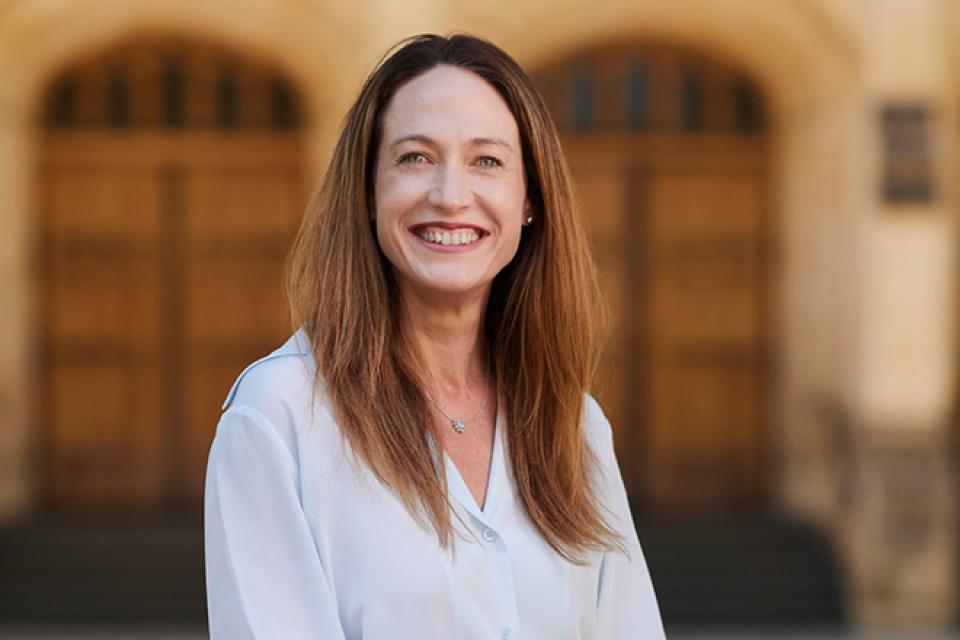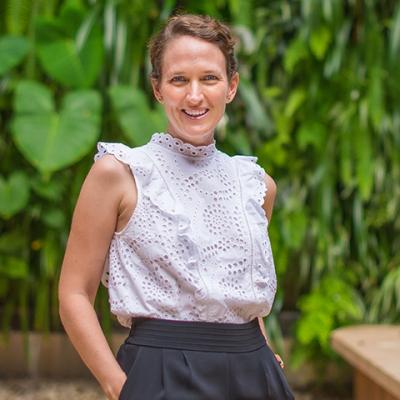Bachelor of Arts students at UQ have plenty of language majors to choose from: Chinese, Japanese, Korean, Indonesian, French, German, Italian, Spanish and Russian.
But is picking up one of these majors worth it if you don’t have a specific language you’re interested in learning?
To put it simply, yes. Because there’s so much you can do with a language major. And being fluent in even one additional language can open up a literal world of career opportunities.
We spoke with Dr Angie Knaggs, Senior Learning Designer for Employability at UQ’s School of Languages and Cultures, to learn more about what a language major offers for students.
Are languages good majors?
Angie believes what makes languages such valuable majors is their versatility. Language skills can take any career ambitions you have onto the global stage.
“Study of a language makes whatever you choose to study, and whatever career path you find yourself on, borderless,” she says.
“It extends the reach of what you can achieve and offers a significant value boost to your profile.”
For anyone who loves travel or wants to develop a worldly perspective through their career, the appeal is obvious. But studying a language major can also be incredibly valuable for someone who plans to stay at home – it’s not just for students with their hearts set on a specific destination.
“The reasons for studying a language do vary widely,” says Angie.
“It often comes down to preparing for a particular exchange program, a student’s passion, finding joy in the culture, or enjoying the challenge of learning a language.”
Feel like you don’t have room for a language major? That’s understandable since you’ve got over 45 majors to choose from in the Bachelor of Arts. Sometimes learning a second language doesn’t make the cut.
But – good news – most domestic students at UQ can complete a Diploma in Languages as part of their studies. So, if you’re torn about sacrificing your language major for something else, you could consider this option instead!
“This is a concurrent diploma, meaning students can do it at the same time as their chosen study program, and receive both the diploma and their degree on their transcript – bonus!”
Skills you get from studying other languages
“Research shows that language learning provides a wealth of cognitive benefits,” says Angie.
These can include:
- boosting academic achievement in other subject areas
- enhancing critical-thinking skills
- improving memory, concentration and decision-making abilities
- building strong communication skills
- fostering a greater capacity for empathy, tolerance and cultural awareness.
“In the School of Languages and Cultures, we believe that an expanded world view is critical to developing an intercultural perspective and that language learning is key in this process,” says Angie.
“We set our students on the road to success by developing their intercultural communication skills, critical thinking and understanding of self and others, enabling them to transfer the value of their studies in the school into their futures as leaders in their chosen fields.”
Alumni spotlight: Andrew Conduit
- Co-Founder (SKC Law), Director (PT. SKC Intellectual Property), Director (PT. Ten Eighty Consulting Indonesia)
- Bachelor of Arts (Indonesian, Japanese) / Bachelor of Laws (Honours)

Based in Jakarta, Indonesia, Andrew is co-founder of an IP law firm, director of an IP startup, and director of a management consulting company.
"Indonesian language skills (written and spoken) are critical to succeed in these roles, and it was my Indonesian studies in my BA that helped me get here!"
What can you do with a language major?
For Angie, the answer is both simple and exciting.
“Anything,” she says.
“Our students can do anything they want.”
With a language major, you can take any career options available to you via your other major/degree and multiply it by the number of places that use your new language. The world – or at least parts of it – are your oyster.
Alumni spotlight: Dr Jessica Gallagher
- Deputy Vice-Chancellor (External Engagement) at University of Adelaide
- Bachelor of Arts (Honours) (German Language, Business German, Journalism) / Doctor of Philosophy

"Don’t let people tell you that an arts degree won’t lead to a great job – the opposite is true. An arts degree will give you the foundation for an amazing career across many sectors. The knowledge, skills and experience that I gained during my degree have shaped my career.
"My BA taught me how to write well, work in teams, analyse and interpret information to form an opinion and construct an argument, and develop a strong understanding and appreciation of languages and cultures. It gave me the opportunity to pursue studies in areas of interest and importance to me, which have now become core to the work that I do – building global partnerships, connecting with people across sectors and geographies, leading teams and advocating for international education."
"Through the BA, I was also able to undertake studies in Germany, which broadened my perspective on national and cultural identity, multiculturalism and socio-politics."
Jobs for language majors
It’s difficult to narrow down a list of common jobs for graduates with language majors, as they often pursue a profession based on their other area of study. However, here is a snapshot of just some of the possibilities, focusing on jobs that specifically require an expertise in languages:
- international business consultant
- language teacher (teaching another language to students in English or teaching English as a second language)
- cultural coordinator
- translator/interpreter
- tourism/travel consultant
- foreign language analyst
- multilingual customer coordinator
- international business translator
- global supply chain manager
- cultural marketing coordinator
- diplomat/public servant
- cultural policy advocate
- migration agent
- export control adviser.
And we’re only scratching the surface of all the jobs that could be on your horizon.
Alumni spotlight: Tom Clarke
- Founder/owner of Coutume
- Bachelor of Arts (French, International Relations) / Bachelor of Laws (Honours)

"Study what you’re passionate about and the rest will fall into place."
Tom has been fortunate enough to live out his dream of starting his own company (Coutume) and see it grow over the last 12 years.
"What started as a desire to bring a quality coffee culture to France has become a team of 100+ individuals working between our coffee roastery, retail network, wholesale program and back-office," he says.
"Simply put, my BA and major in French provided the opportunity and language skills to complete 1 year of my studies in Paris at Sciences Po, which sowed the seeds for starting Coutume. The field of humanities provides great insight and depth into understanding our species and society."
Study another language at UQ
The exact makeup of your major will depend on which language you choose. But the language majors at UQ typically include some combination of:
- foundational/introductory courses
- written language courses
- spoken language courses
- courses about the society and culture connected to the language
- courses about literature from the language
- courses about translating between the language and English.
What languages can you study in the Bachelor of Arts?
The majors available to language students in the UQ Bachelor of Arts include:
- Chinese
- Chinese Translation and Interpreting
- Japanese
- Japanese Advanced
- Korean
- Indonesian
- French
- French Advanced
- German
- Italian
- Spanish
- Russian (minor)
Explore UQ’s language majors Explore other options in the UQ Bachelor of Arts






